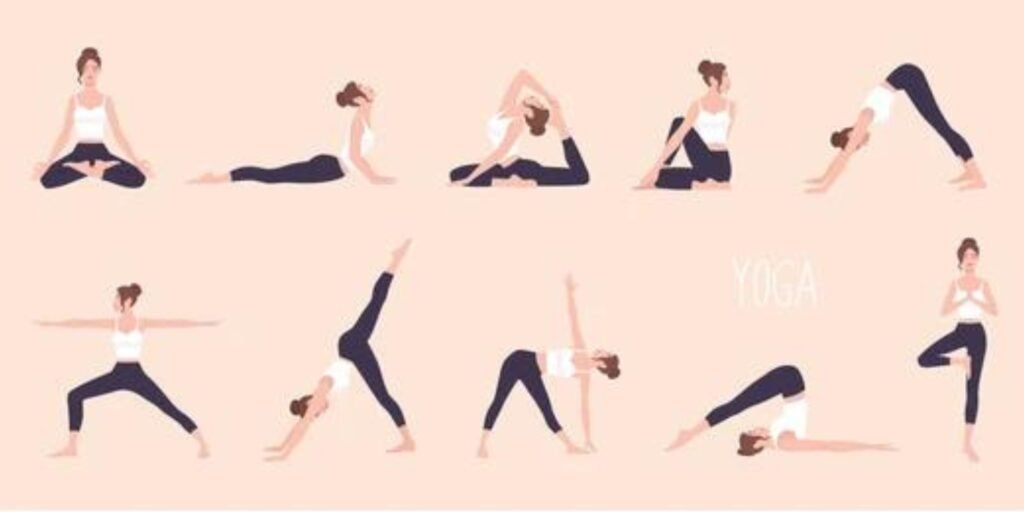“Hatha Yoga Boosts Your Mental Health” Did you know that 15-30 minutes of hatha yoga per day can improve your mental health? It’s also boosts your well-being. Studies have shown that this ancient practice offers many benefits. It reduces stress and anxiety and promotes inner peace and emotional balance.
In this article, we’ll explore 7 powerful ways hatha yoga can improve your mental health. It can also boost your happiness. Discover how this mind-body connection can help you with mindfulness. It’s aids with stress relief and anxiety management. It can also guide you to deeper inner peace and emotional balance.
Hatha Yoga Boosts Your Mental Health

Hatha yoga is a type of yoga. It focuses on physical postures (asanas), breathing exercises (pranayama), and meditation. Unlike more vigorous yoga, hatha yoga is slower and more deliberate. It’s accessible to people of all fitness levels. Hatha yoga is holistic. It integrates the mind, body, and spirit. This is what makes it so good for mental health. Hatha yoga brings many benefits. It reduces stress and anxiety, and improves mood and emotions. It can improve the well-being of those who practice it.
You May Also LIke:
10 Powerful Hatha Yoga Poses to Prevent Back Pain
The Mind-Body Connection

The practice of Hatha yoga revolves around the concept of connecting the mind and body. The physical practice of asanas, breathwork, and meditation influence mental and emotional states. This approach is holistic. Many people believe that there is a connection between the body and mind. Helping one can affect the other.
Understanding the holistic approach.
Hatha yoga helps practitioners understand the mind-body connection. It leads to better emotional balance and mental well-being. The practice helps people notice their thoughts, feelings, and physical sensations. It lets them better control their emotions.
Fostering Emotional Balance
The balance from yoga helps. Hatha yoga can help people cultivate self-awareness and self-regulation. Practitioners are becoming more aware of the link between their mind and body. They can learn to navigate their emotions more effectively.
Mindfulness Practice

Hatha yoga has a key aspect. It adds to its mental health benefits. It emphasizes mindfulness. Hatha yoga has slow, deliberate movements and deep breathing exercises. They encourage practitioners to be present. They should focus on the body’s sensations and the flow of its breath.
You May Also Like:
Unlock Your Potential with Powerful Yoga Sequences 2024
Being present in the moment.
This practice of being present in the moment cultivates a non-judgmental awareness. People learn to observe their thoughts and emotions without getting caught in them. By staying present, hatha yoga practitioners can learn to handle stress. They can also learn to deal with anxiety and negative thoughts.
Cultivating non-judgmental awareness.
Mindfulness practice promotes inner peace. It’s a key benefit of hatha yoga. Practitioners learn to view their experience without judgment. They can then start to let go of the worries and anxieties that often fill the mind. This greater awareness and self-acceptance can transform a person’s mental well-being.
Stress Relief Techniques
Hatha yoga provides many stress relief techniques. They can improve mental health. Pranayama is the practice of breathwork exercises. It’s very effective at reducing stress and anxiety. By focusing on slow, deep breathing, practitioners can activate the parasympathetic nervous system. This system handles the body’s rest and digest response.
Breathwork Exercises
The breathwork exercises are part of hatha yoga. They can help people manage anxiety. These exercises help to calm the mind and body, promoting a sense of relaxation and inner peace.
Gentle Stretching and Asanas
Also, hatha yoga’s gentle stretching and physical postures, called asanas, release muscle tension. They promote physical relaxation, which can calm the mind. These stress relief techniques can help individuals with mental health challenges. These challenges include anxiety, depression, and chronic stress.
You May Also Like:
Top 11 Hatha Yoga Asanas to Ease Stress and Anxiety
Anxiety Management

Studies have shown that practicing hatha yoga helps manage anxiety. The postures, breathwork, and meditation can help. They can ease the physical symptoms of anxiety. These include muscle tension, rapid heartbeat, and shallow breathing. By focusing on the body and the breath, practitioners can learn to stop anxious thoughts. They can also learn to stop physical sensations. This calms the mind and body.
Also, hatha yoga’s meditative aspects can help cultivate calm and acceptance. This can help those with anxiety. The practice encourages people to watch their thoughts and feelings without judgment. This allows them to better control their emotions in stressful situations.
Through yoga, I’ve learned to approach my anxiety with more kindness. I also understand it better. The breathwork and meditation have been invaluable. They’ve helped me find calm and peace.
Adding hatha yoga to their daily routine can help anxious people. It can give them a powerful set of tools to manage their symptoms and improve their mental wellness. This ancient practice is holistic. It is effective and accessible. It’s for those seeking emotional balance and resilience.
Meditation for Calm
Meditation is key in hatha yoga. It’s crucial for mental health and emotional well-being. Meditation is part of hatha yoga. It calms the mind by reducing the chatter of thoughts and worries. These can cause stress and anxiety.
Quieting the Mind
By focusing on the breath and not judging, practitioners can learn to relax. Meditating can bring deep calm. It’s can help mental health and happiness.
Developing inner peace.
Practitioners delve deeper into the calm aspect of hatha yoga. They can feel a stronger inner peace and emotional balance. Meditation helps people let go of worries, anxieties, and negative thought patterns. These can weigh down the mind and spirit. Letting them go allows people to embrace a calm and centered mindset.
Yoga for Mental Wellness
Regular hatha yoga improves mood. It also improves mental well-being. The mix includes movement, breathwork, and meditation. It’s able to release feel-good neurotransmitters like serotonin and dopamine. These can boost mood and create a sense of happiness and contentment.
Enhancing Mood and Happiness
Yoga’s mind-body approach boosts mood and happiness. Practitioners can experience this boost through yoga. The asanas, or physical postures, release tension and promote relaxation. The breathing exercises and meditation calm the mind. They reduce stress and bad feelings.
Promoting Self-Acceptance
Yoga has mood-enhancing benefits. Also, it can foster self-acceptance and self-compassion. People become more attuned to their thoughts, feelings, and physical sensations. They learn to approach themselves with kindness and without judgment. This greater self-awareness and self-acceptance can have a positive effect. It ripples out to an individual’s mental health. It can lead to better self-esteem, less anxiety, and a stronger sense of well-being.
Inner Peace Promotion
Hatha yoga has many deep benefits. It’s able to promote inner peace and emotional balance. The practice encourages practitioners to let go of worries, anxieties, and negative thoughts. These can weigh down the mind and spirit. Hatha yoga combines physical postures, breathwork, and meditation. It helps people cultivate serenity and equanimity. These make it easier to navigate the ups and downs of life with a calm and centered mindset.
Letting Go of Worries
Hatha yoga teaches people to release worries and anxieties. These often consume the mind. The focus on the present moment is key. It’s, along with breathwork and gentle movement, calms the mind. They let practitioners let go of racing and negative thoughts. These can cause stress and emotional turmoil.
Embracing Serenity
Practitioners immerse themselves in hatha yoga. They can develop deep inner peace. The practice is meditative. It enhances mind-body awareness. It’s letting people cultivate calm and peace. This balance can have a ripple effect. It can impact all parts of a person’s life, from personal to professional.
You May Also Like:
8 Powerful Hatha Yoga Poses for Beginners
Emotional Balance through Yoga

Hatha yoga takes a holistic approach. It integrates the mind and body. This can be very helpful for achieving emotional balance. The practice helps people become aware of their thoughts, feelings, and physical sensations. This allows them to better manage anger, sadness, and anxiety.
Managing Negative Emotions
Hatha yoga uses breathwork, meditation, and gentle movement. They help practitioners to notice and release these hard emotions. Understanding their emotions better gives people the tools to handle tough feelings. They can do so with more ease and self-compassion. Hatha Yoga Boosts Your Mental Health
Cultivating a positive mindset.
At the same time, yoga can also improve mental wellness. It does this by fostering a positive mindset. It promotes gratitude, self-compassion, and inner strength. Practitioners become more attuned to the present moment. They notice the harmony of their mind and body. They can then feel more emotional balance and well-being.
This balance can improve mental health. It fosters a more centered, resilient, and content state of being. People can unlock the path to better emotions and growth by doing hatha yoga. Hatha yoga has holistic benefits.
Holistic Mind-Body Connection

The foundation of hatha yoga is the belief in the interconnectedness of the body and the mind. Hatha yoga integrates movement, breathwork, and meditation. It unites the physical and mental states of its practitioners. This whole approach promotes mental health. It’s also boosts well-being.
Integrating Body and Mind
People are becoming more aware. They see how their thoughts, emotions, and body sensations connect. This helps them understand themselves better. It helps them manage stress, control emotions, and build a positive mindset. Hatha yoga is holistic. It’s a powerful tool for balancing the mind and body.
Enhancing well-being.
Fostering this mind-body connection helps hatha yoga practitioners. They can experience many benefits that go beyond mental health. The practice can enhance well-being. It helps individuals find more joy, contentment, and balance in their lives. You might seek to improve your mental clarity or emotional regulation. Or, you might want a more fulfilling life. Adding hatha yoga to your routine can transform your life. It’s a step toward a healthier, happier, and more harmonious life.
Conclusion
In conclusion, researchers have shown that doing hatha yoga benefits mental health. Hatha yoga cultivates a deep connection between the mind and body. It can help people reduce stress. It can help them manage anxiety and improve their mood. It can also help them find inner peace and emotional balance.
Hatha yoga integrates postures, breathwork, and meditation. It provides a holistic approach to well-being. This approach can affect a person’s mental health and happiness. It can do so for a long time. It can help with mental clarity, emotional regulation, and finding joy. Adding hatha yoga to your routine can transform your life. It can help you become healthier, happier, and more fulfilled.
Hatha yoga can improve your mental health. It offers many benefits that can improve your life. This ancient practice fosters a holistic mind-body connection. Embracing it’s a way to bring you a deeper inner peace. It will also bring emotional balance and lasting happiness.









